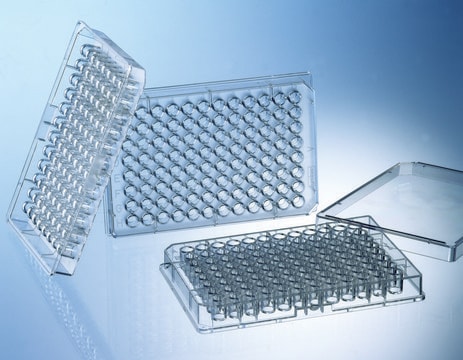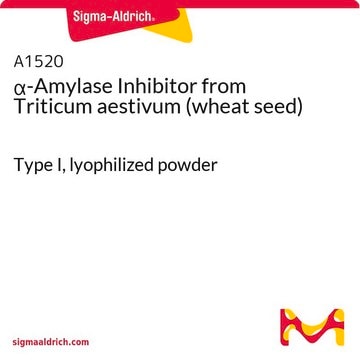MAK009
Amylase Activity Assay Kit
sufficient for 100 colorimetric tests
Sign Into View Organizational & Contract Pricing
All Photos(3)
About This Item
UNSPSC Code:
12161503
NACRES:
NA.84
Recommended Products
usage
sufficient for 100 colorimetric tests
detection method
colorimetric
relevant disease(s)
endocrinological disorders, diabetes; gastrointestinal diseases
storage temp.
−20°C
Gene Information
human ... AMY1A(278)
General description
The new Amylase Assay Kit, MAK478, is now available! Amylase enzymes are glycoside hydrolases, which cleave glucan linkages in polysaccharides such as starch or glycogen to release polysaccharide molecules. α-Amylase is found in animals, plants, and many fungi. In mammals, α-amylase is the predominant form of amylase and is one of the major enzymes of dietary digestion. Both the activity and the stability of α-amylase is dependent on calcium ions. In humans, α-amylase levels are highest in pancreatic and salivary secretions. Increased blood and urine levels of amylase occur due to pancreatic disorders and salivary trauma. Increased salivary amylase activity is also a marker for increased sympathetic nervous system activity.
Application
Amylase Activity Assay Kit has been used to determine the activity of amylase.
Suitability
Suitable for the quantification of amylase activity in a variety of biological samples.
Principle
The Amylase Activity Assay kit quantifies amylase activity in a variety of biological samples. The assay is quick, convenient, and sensitive. In this kit, amylase activity is determined using a coupled enzymatic assay, which results in a colorimetric (405 nm) product, proportional to the amount of substrate, ethylidene-pNP-G7, cleaved by the amylase. One unit is the amount of amylase that cleaves ethylidene-pNP-G7 to generate 1.0 μmole of p-nitrophenol per minute at 25 °C.
replaced by
Product No.
Description
Pricing
Signal Word
Danger
Hazard Statements
Precautionary Statements
Hazard Classifications
Resp. Sens. 1
Storage Class Code
10 - Combustible liquids
Certificates of Analysis (COA)
Search for Certificates of Analysis (COA) by entering the products Lot/Batch Number. Lot and Batch Numbers can be found on a product’s label following the words ‘Lot’ or ‘Batch’.
Already Own This Product?
Find documentation for the products that you have recently purchased in the Document Library.
Customers Also Viewed
X Chen et al.
Poultry science, 95(4), 834-841 (2016-01-08)
A 14-d study was conducted to determine the impact of dietary crude protein concentration on performance, serum biochemistry, and nutrient digestive functions in Pekin ducklings during aflatoxicosis. A total of 144 male Pekin ducklings were randomly allotted to 4 dietary
Galactose protects against cell damage in mouse models of acute pancreatitis.
Peng S, et al.
The Journal of Clinical Investigation (2018)
Evaluation of amylase and lipase levels in blunt trauma abdomen patients.
Kumar S, et al.
Journal of emergencies, trauma, and shock, 5(2), 135-135 (2012)
Dalila Azzout-Marniche et al.
The Journal of nutrition, 149(2), 270-279 (2019-02-13)
We have reported large differences in adiposity (fat mass/body weight) gain between rats fed a low-fat, high-starch diet, leading to their classification into carbohydrate "sensitive" and "resistant" rats. In sensitive animals, fat accumulates in visceral adipose tissues, leading to the
Philip van der Zee et al.
Purinergic signalling (2018-05-13)
Recent research suggested an important role for pulmonary extracellular adenosine triphosphate (ATP) in the development of ventilation-induced lung injury. This injury is induced by mechanical deformation of alveolar epithelial cells, which in turn release ATP to the extracellular space. Measuring
Our team of scientists has experience in all areas of research including Life Science, Material Science, Chemical Synthesis, Chromatography, Analytical and many others.
Contact Technical Service









